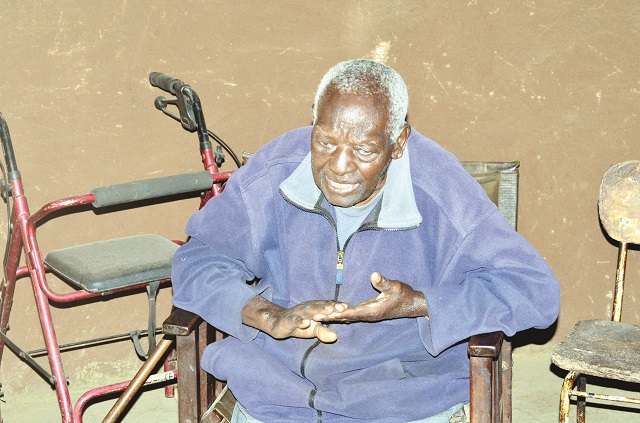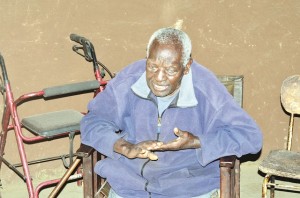
The Sunday News

WHEN the liberation war was raging on throughout the country not only did guerillas bear the brunt of the conflict as ordinary people also played an active role.
Civilians were the proverbial grass which suffered when two elephants fought.
The civilians provided the freedom fighters with food, clothes and intelligence. One of the people who faced the vagaries of the war when guerillas from the country’s two nationalists forces, Zipra and Zanla engaged in fierce battles with the Rhodesian forces is now 98-year-old Cde Jakobe Ndlovu of Bezha in Umzingwane District in Matabeleland South. Mr Ndlovu who was born on 19 March 1919 probably has a unique war background in the sense that he became the darling of both Zipra and Zanla forces during the armed struggle.
Living in an area near a mountain range coupled with thick vegetation made Cde Ndlovu’s homestead an attractive place for the guerillas as the terrain provided excellent cover. Close to Cde Ndlovu’s homestead is the home of National Hero and former Zanla Chief of Training the late Mark Nuda Dube whose pseudo name was Joshua Misihairabwi.
Cde Dube, a relative of Ndlovu’s wife, Elizabeth (nee Dube) was to become the Governor of Matabeleland South after the war of Independence. Breaking from tradition in this column where the interviews carry stories of guerillas during the liberation war our Assistant Editor Mkhululi Sibanda (MS) on Wednesday traced Cde Ndlovu to find out how he delicately balanced the two liberation forces without attracting the wrath of either as at times there were unfortunate incidents of turf war. Below are excerpts of the interview:
MS: Speaking from a civilian’s point of view how was the war of liberation Khulu Ndlovu?
Cde Ndlovu: It was not an easy period as people suffered. As for us people of this area we had three armies operating here. We had the Rhodesians who were patrolling this area and that was made possible by the fact that the Mbalabala Barracks are not far off from here. Besides the Rhodesian forces there came a time when we started seeing more of the Zipra and Zanla forces here.
MS: Were you all along involved in politics?
Cde Ndlovu: Yes, I was an active member of Zapu and I was the treasurer of this area. I started noticing political injustices when I worked for white families in Bulawayo’s Suburbs area. I worked for two families after which I left for South Africa and that was around 1940. I was to return home and start a horticulture project, which was supported by the rearing of chickens and other farming activities which improved the life of my family.
We became a big source of vegetables, sweet potatoes, fruits such as oranges with people coming afar coming here to buy. Even the Rhodesian government institutions were our customers but that did not compromise my stance on the need for our freedom. By that we had bought a diesel powered engine pump which drove further our farming activities as a family. I then got a house in Mpopoma suburb in Bulawayo but I continued with my farming activities which were the envy of many.
However, as for politics ,like I said, I participated in Zapu activities. At one time when I was in Bulawayo the party gave me the responsibility to look after a Zipra guerilla, Makanyanga who had come for urban operations in Bulawayo but something happened and he needed to be hidden somewhere until the situation cooled off.
MS: That was a big responsibility. Was this Makanyanga comrade armed?
Cde Ndlovu: No. He was not armed when he came here to live with us. I brought him to my homestead here and introduced him to locals as one of my workers. He joined my other workers and did all the domestic chores. While he was here at times he would walk the long distance to Essexvale (Esigodini) to buy things like diesel and at times he would go to Ballaballa (Mbalabala). Although he liked walking as he said that it made him to keep fit, at times he would cycle. That he was a guerilla was only known by my wife and the Zapu people who handed him to me. He stayed for almost seven years here and one day he told me that he was leaving to join others and away he returned to Zambia. He survived the armed struggle and some people saw him in Bulawayo after the war.
MS: Did he at one point visit your family after the war?
Cde Ndlovu: Not at all, we heard stories that he had taken to heavy drinking and that could have been the reason why he did not have time to come here and visit. We were later told that he had died.
MS: Then as the war progressed guerillas started operating in this area. Take us through that period.
Cde Ndlovu: The first to arrive here were Zipra forces. Then there was an incident when the Zipra forces killed a white commercial farmer whose name was called Ashibie I think. What happened was that after that incident there came some Selous Scouts (wife Elizabeth joins in to elaborate). The Selous Scouts as you might be aware pretended to be guerillas and that is what they did. They asked for food just like what the guerillas were doing and one Zapu member called Zephaniah Ncube got so excited and started releasing all the information about the party structures. He thought he was talking to the Zipra guerillas. After some days we were rounded up and taken to Esigodini, we were many and I spent 30 days in custody. I was saved by one member of the Selous Scout who tipped me not to admit to the offence. It was when I realised that those people whom we thought were guerillas were Rhodesian soldiers as that boy (Selous Scout) told me that there was no reason to admit because I was not at the gathering when Zephaniah spoke about the party structures and that we had hosted the guerillas. I was to be arrested again and this time taken to Gwanda Prison for supporting the guerillas. I spent 44 days in custody. I was released after Zapu hired a lawyer for me. I then fled to Bulawayo where I continued attending Zapu meetings. I returned home later.
MS: What happened to other people who were arrested with you?
Cde Ndlovu: Some were jailed and as for Zephaniah he was sentenced to eight years in prison and he only came out of jail after the ceasefire period.
MS: Zanla forces also operated in some parts of Matabeleland South and Umzingwane District was one of them. Tell us about their operations.
Cde Ndlovu: It’s true that we had Zanla forces here. The day they first arrived here they came straight to my homestead. The first group had about 20 guerillas. They asked me about politics and I did not hide anything from them. I told them I was an active Zapu member. I then explained to them that when it came to the guerillas I supported anyone who was fighting the Rhodesians. I told them that our common enemy was Ian Smith and that I would do anything for them. I was also clear that they were just like my children and I would treat them as such and they were very impressed. I told them to be free and ask for anything. From then we started working together and they used to base up there (pointing at a spot on the nearby hill). In fact I had three sons that had gone to war, one died in a bombing incident in Zambia, the other died at Shagari in Lower Gweru while on duty in the Zimbabwe National Army. The third one died in recent years and was buried at the Bulawayo Provincial Heroes Acre. So when I looked at those boys fighting for the freedom of this country, I could not separate them from my sons who had also gone to the war.
MS: Do you remember the names of some of the Zanla guerillas you related with?
Cde Ndlovu: Among the group there was Cousin Khumalo, Richard, Ali Baba and Tafirenyika. Obviously those were war names, I did not get to know their real names. Among their units there were Ndebele speakers although the majority were Shona speaking. However, because of good relations with the two sets of guerillas, some fellow villagers tried to have me killed and they cooked a story that I wanted to poison the Zanla forces. All along those people had been jealous of my success, they had reported to the Rhodesian forces that I was harbouring guerillas, resulting in my second arrest where I spent 44 days at Gwanda Prison.
MS: When the guerillas heard about that cooked up story what did they do?
Cde Ndlovu: On that day the guerillas had split into some smaller units with some basing near Bezha Business Centre where there was a pungwe while others had gone somewhere. Those who remained at the base near my homestead were Richard and two others. So at about 8pm Richard came here (the homestead) and ordered me to accompany him to the base up the hill. When we got there he told he had information that I was planning to do something bad to them. They then tied my hands with a strong rope and said I would be killed the following day. Angikwazi ukuthi wayengenwe yini umntwana lowana (I don’t know what had gotten into that child). Then at around 2am Tafirenyika came to the base and found me in that position. He asked what was happening and I told him that it was Richard and the other two whose names I can’t remember. Tafirenyika got angry and told Richard if they had laid their hands on me he could have killed them.
MS: So that is how you survived?
Cde Ndlovu: I survived that way. Tafirenyika then untied me. Word then spread that I had been killed at the base. When the other Zanla guerillas who had based near Bezha Business Centre learnt that I was in trouble they came in a hurry to where I was. They were very relieved to find me alive. They told Richard in no uncertain terms that if he had shot me they could have executed him together with his other two colleagues. The behaviour of those Zanla guerillas even shocked me. It then dawned on me that I meant a lot to those boys. All along I had not realised that I was working with them so well. Their concern about my security humbled me. I wish I could again meet some of those boys. I will be happy if they could visit me if they are still alive.
MS: What about the Zipras?
Cde Ndlovu: I worked with them as well, there were no problems. They would also come to my homestead here. However, later on I had to flee from my home as the Rhodesians were after me and I went to live in Bulawayo. The Rhodesians wanted me dead and even my family had to leave this area as well. We were to return after the ceasefire period.




